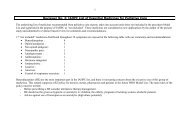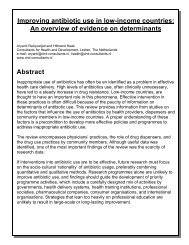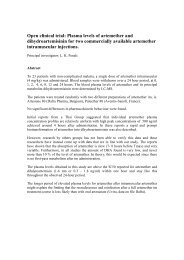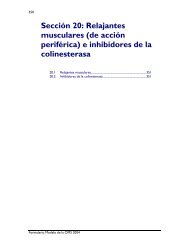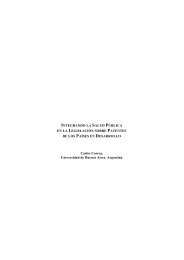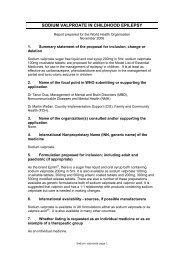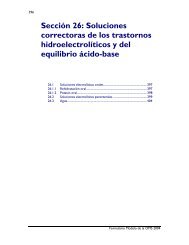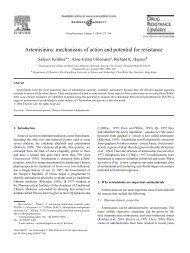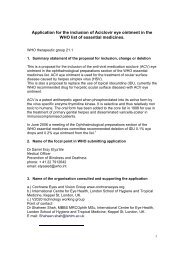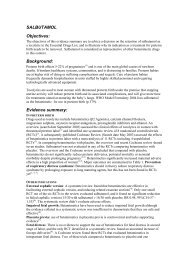Artesunate + mefloquine fixed-dose combination
Artesunate + mefloquine fixed-dose combination
Artesunate + mefloquine fixed-dose combination
Create successful ePaper yourself
Turn your PDF publications into a flip-book with our unique Google optimized e-Paper software.
Method of administration<br />
Just before administration, the Artequin Paediatric stickpack should be opened (following the preprinted<br />
doted line on the top of the stickpack) and its content (pellets) should be administered directly<br />
on to the patient’s tongue.<br />
In case of direct mouth administration difficulties, the stickpack content can be put on a spoon and<br />
administered with a small amount of liquid.<br />
The mouth should thereafter be rinsed with some liquid, e.g. with milk or water, and remaining pellets<br />
swallowed. Patients should be encouraged to resume normal food intake as soon as food can be<br />
tolerated.<br />
4.3 Contra-Indications<br />
Artequin Paediatric is contraindicated in patients with a known hypersensitivity to artesunate or<br />
<strong>mefloquine</strong>, to their chemically related compounds like other artemisinin derivatives, quinine, quinidine<br />
or chloroquine, or to any other ingredient of the stickpack content. Artequin Paediatric must not be<br />
used together with halofantrine.<br />
4.4 Special warnings and special precautions for use<br />
Artequin Paediatric is not recommended for the prophylaxis of malaria.<br />
In epileptics, <strong>mefloquine</strong> may increase the risk of seizures. In these patients Artequin Paediatric<br />
should therefore only be used if absolutely required by the medical condition.<br />
Halofantrine, which is known to cause QT interval prolongation, must not be administered<br />
concomitantly with or after a <strong>mefloquine</strong>-containing antimalarial agent like Artequin, because of the<br />
risk of a potentially fatal prolongation of the QT interval.<br />
Incidents of dizziness, disturbed sense of balance or neuropsychiatric reactions have been reported<br />
both during use and up to three weeks after the last <strong>dose</strong> of <strong>mefloquine</strong> due to its long half-life.<br />
Therefore, caution is also advised in patients receiving any dos-age regimen of Artequin when<br />
pursuing activities requiring full attention and fine-motor co-ordination for example driving vehicles and<br />
operating machinery.<br />
Artequin Paediatric is not recommended for use in patients who have less than 10 kg body weight.<br />
Higher Artequin dosage regimens are recommended for use in patients who have more than 20 kg<br />
body weight.<br />
4.5 Interaction with other medicinal products and other forms of interaction<br />
So far, there have been no reports of negative drug interactions with artesunate.<br />
Concomitant administration of <strong>mefloquine</strong> and related substances (e.g. quinine, quinidine and<br />
chloroquine) may produce electrocardiographic abnormalities and increase the risk of convulsions.<br />
Therefore, halofantrine, which is known to cause QT interval prolonga-tion, must not be administered<br />
concomitantly with or after<br />
Artequin for at least 3 weeks. In patients undergoing treatment with anticonvulsives such as valproic<br />
acid, carbamazepine, phenobarbital or phenytoin, <strong>mefloquine</strong> contained in Artequin may lower the<br />
plasma concentration of the anticonvulsive, resulting in seizures. In such cases, it may be required to<br />
adjust the dosage of the anticonvulsive (see also section 4.4).<br />
4.6 Pregnancy and lactation<br />
Pregnancy category C<br />
Clinical experience with artesunate or <strong>mefloquine</strong> used as monotherapy has not revealed any<br />
embryotoxic or teratogenic effects. However, as experience in pregnant patients is limited, Artequin<br />
should not be administered during pregnancy unless the treatment is considered life saving and the<br />
expected benefit justifies the potential risk for the foetus.<br />
Mefloquine passes in small quantities into breast milk, the effects of which are, however, unknown.<br />
Therefore, decision should be made whether to treat the mother with Artequin, taking into account the<br />
importance of the drug to the mother.<br />
<strong>Artesunate</strong>/Mefloquine Hcl, Fixed <strong>dose</strong> <strong>combination</strong> 9/14



